
Be Inclusive Workshop Series
In February 2013 at the Association for the Sciences of Limnology and Oceanography (ASLO) Aquatic Sciences Meeting, the Centers for Ocean Sciences Education Excellence - Ocean Systems (COSEE-OS) and the Institute for Broadening Participation (IBP) hosted a pair of pilot workshops aimed at effective ways to present scientific information, addressing preconceptions towards science and understanding how to communicate to various audiences. The first workshop involved demonstrating to research scientists how to share their research effectively while the second focused on illuminating the positive factors that research indicates support success in STEM (Science, Technology, Engineering and Math) careers and reduce barriers to participation. The majority of attendees found the workshops useful and seemed to be receptive to the idea of using an alternative presentation method (i.e. concept mapping) as a way to communicate their science in an inclusive and effective manner.
Be Inclusive I: Share Your Research Effectively
Wednesday, February 20 6-8:30pm
 Be Inclusive I Participants |
This workshop was divided into three parts: Deconstructing Your Pathway to Science, Constructing Your Pathway to Science, and Common Conceptions About Science. The overarching goal was to give research scientists tools and techniques to help them communicate their science effectively.
Workshop-Specific Goals:
- To identify “higher-level” concepts that bridge research fields. Participants split into pairs and constructed a concept map that combined both of their research interests along with the added concept of “climate.”
- To deconstruct their pathway to becoming a scientist and to then share their stories through the use of concept mapping. Individuals spread out and mingled, giving others an opportunity to examine their maps while listening to the map creators’ stories.
- To better understand how to build on common conceptual understanding in order to tell their science story in an effective manner. To achieve this goal, COSEE-OS staff developed a variety of the popular “What I Really Do” online meme.
- To discuss how they could use their research to dispel myths about science using their own research, using a handout on preconceptions in science (generated by the University of California at Berkeley) as a guide.
Be Inclusive II: Address Barriers to Participation
Thursday, February 21 12-1:30pm
This workshop progressed through four stages, with an overarching goal being to increase participants’ understanding of positive factors that support success in STEM careers and reduce barriers to participation.
Workshop-Specific Goals:
- Recap of peer-identified positive factors from the first workshop
- Special speaker presentations on the impact of positive factors and barriers on their personal STEM pathways (Dr. Ambrose Jearld, Director of the Woods Hole Partnership Education Program and Dr. Thomas Windham from the Center for Multiscale Modeling of Atmospheric Processes at Colorado State University)
 A portion of Dr. Ambrose Jearld's "life map" constructed for Be Inclusive II. |
- A closer look at research-based evidence on positive factors ("Designing For Success")
- Small group discussion to consolidate understanding through listening and reflecting and envision context-based strategies for implementation.
- Undergraduates suggested serving as “near peer” mentors to lower division students, citing that they wished someone had done this for them
- Post-docs/graduate students proposed doing outreach activities such as working directly with K-12 students in the capacity of role models
- Senior faculty shared their experiences with “plugging into” effective regional and national programs.
|








